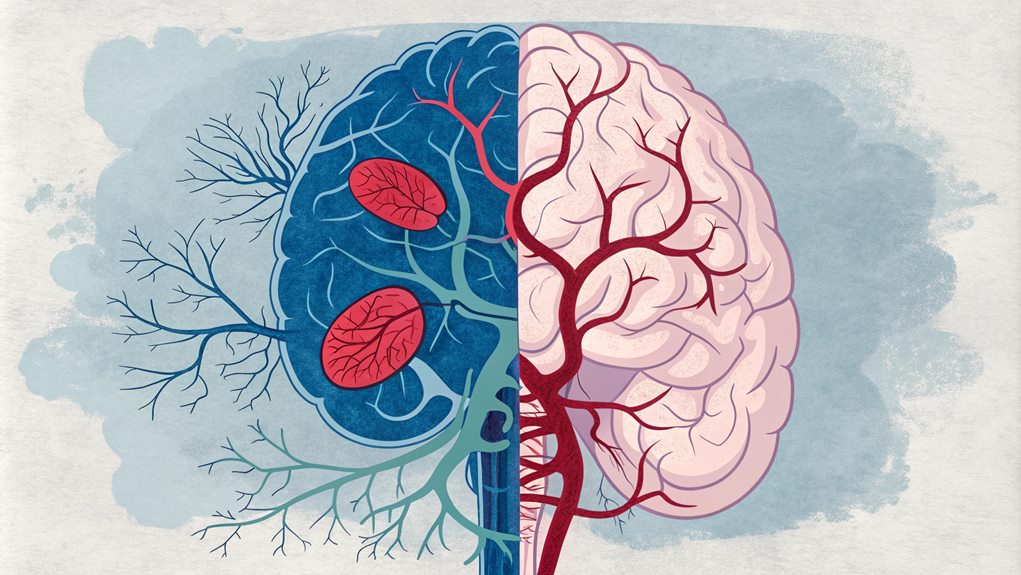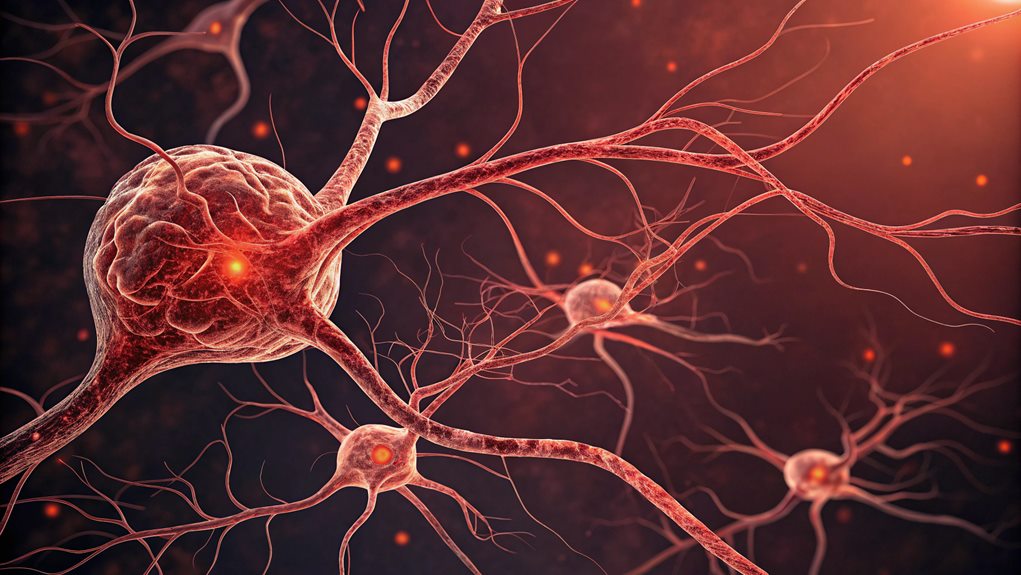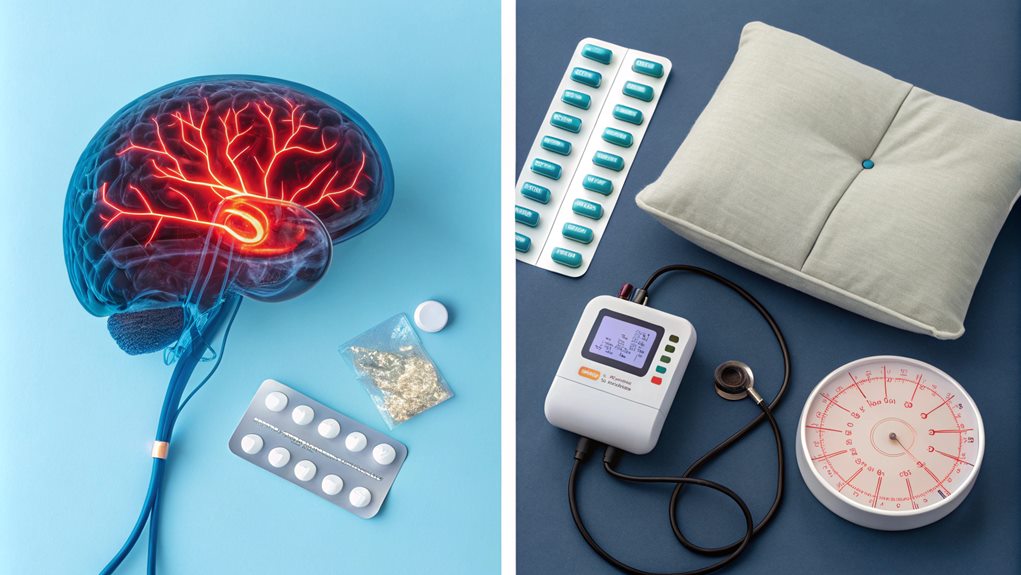Can High Blood Pressure Cause Confusion and Memory Loss

If you’re experiencing moments of confusion or struggling to remember simple things, your blood pressure might be the culprit.
Your brain relies on a complex network of blood vessels to function properly, and when high blood pressure damages these pathways, it can trigger a cascade of cognitive changes you might not immediately connect to hypertension.
While occasional forgetfulness is normal, persistent memory issues and mental fog could signal that your elevated blood pressure is affecting your brain health.
Understanding this connection and its mechanisms will help you protect your cognitive function and take control of your health.
Table of Contents
Blood Pressure and Brain Function

When your blood pressure remains consistently elevated, it can damage your brain’s delicate blood vessels and disrupt normal blood flow patterns to critical cognitive regions.
Your blood-brain barrier, which normally protects your brain from harmful substances, becomes compromised under sustained high blood pressure, allowing potentially damaging molecules to enter brain tissue.
These vascular changes directly impact your cognitive function, potentially affecting your memory, processing speed, and executive abilities.
How High Blood Pressure Damages the Brain
The mechanism by which high blood pressure damages the brain involves multiple pathophysiological processes that compromise cerebral function.
When you have sustained hypertension, it triggers cerebrovascular changes that alter blood flow dynamics and vessel integrity.
Your brain experiences oxidative stress factors and inflammation pathways that accelerate neuronal damage, leading to white matter disease and neurodegeneration triggers.
| Brain Region | Damage Mechanism | Clinical Impact |
|---|---|---|
| Blood Vessels | Arterial stiffening and narrowing | Reduced oxygen delivery |
| White Matter | Myelin degradation and lesions | Slowed cognitive processing |
| Grey Matter | Neuronal death and atrophy | Memory and function loss |
Your brain’s blood vessels become damaged through mechanical stress from high pressure, causing microbleeds and reduced perfusion to critical areas.
This vascular compromise leads to chronic ischemic changes, triggering a cascade of inflammatory responses that further damage neural tissue.
The cumulative effect manifests as progressive cognitive decline, particularly affecting areas responsible for executive function and memory consolidation.
White matter lesions develop as myelin breaks down, disrupting neural communication networks and compromising your brain’s processing speed and efficiency.
The Blood-Brain Barrier Connection
Among the most significant mechanisms of hypertensive brain damage lies your blood-brain barrier’s response to elevated blood pressure.
When you have chronic hypertension, it triggers blood brain permeability changes, allowing harmful substances to penetrate this crucial protective barrier that normally shields your brain from toxins and pathogens.
Discover Your Path to a Longer, Healthier Life!
Take our free quiz to see how your lifestyle measures up to the world's longest-living communities and receive expert tips for a healthier, longer life.
Take the QuizYour brain’s capillary damage effects become evident as persistent high blood pressure weakens vessel walls, leading to microscopic tears and inflammation.
This damage compromises the tight junctions between endothelial cells, further degrading your barrier’s integrity.
The decreased oxygenation impact follows as damaged vessels can’t efficiently deliver oxygen and nutrients to brain tissues, contributing to cognitive dysfunction.
These disruptions often result in ischemic lesion formation, where small areas of your brain tissue die due to insufficient blood flow.
Your brain’s oxidative stress vulnerability increases significantly when the blood-brain barrier breaks down, creating a cascade of inflammatory responses that can accelerate neurodegenerative processes.
This combination of effects explains why you might experience confusion, memory problems, and other cognitive symptoms when your blood pressure remains uncontrolled.
Cognitive Changes Under Pressure
Persistent elevations in blood pressure directly influence your cognitive performance through multiple pathophysiological mechanisms.
When your blood pressure remains high, you’ll experience changes in your cognitive aging trajectories, potentially accelerating brain aging by nearly three years.
These alterations affect your executive function, processing speed, and memory retention abilities.
Risk factor identification becomes crucial as you navigate the complex relationship between hypertension and brain health.
You’ll notice impacts across various cognitive domains, including your ability to plan, organize, and maintain attention.
Through long term trajectory modeling, research shows that midlife hypertension particularly affects your brain resilience mechanisms, leading to structural changes like brain atrophy and reduced cerebral blood flow.
Your cognitive changes may manifest as confusion, communication difficulties, or challenges with daily tasks.
Understanding these patterns enables personalized prevention strategies tailored to your specific risk profile.
You’ll need regular monitoring of both blood pressure and cognitive function, as early intervention significantly influences your brain health outcomes.
When you experience persistent cognitive changes, especially sudden confusion or memory loss, seek immediate medical attention.
Memory Loss Mechanisms

High blood pressure can impair your working memory, episodic recall, and procedural learning through disruption of neural networks in the hippocampus and prefrontal cortex.
You’ll experience initial effects like difficulty with short-term information retention and mental processing speed, while chronic hypertension leads to permanent structural changes including brain atrophy and white matter lesions.
Your cognitive processing becomes compromised as reduced cerebral blood flow and microinfarcts interfere with neurotransmitter function and synaptic plasticity.
Types of Memory Affected
Various memory systems in the brain become compromised when exposed to chronic hypertension, with both declarative and non-declarative memory showing distinct patterns of impairment.
You’ll notice that the memory formation process deteriorates gradually, affecting your ability to encode and store new information effectively.
Working memory deficits become particularly evident when you’re trying to manipulate information in real-time or perform complex cognitive tasks.
Your spatial memory issues may manifest through difficulty navigating familiar environments or remembering locations, while episodic memory impairments can affect your ability to recall personal experiences and events.
Memory retrieval challenges often surface when you’re attempting to access previously stored information, even though the memories themselves might still be intact.
The impact typically progresses from subtle changes to more noticeable deficits. You’ll find that procedural memory (skills and habits) tends to remain relatively preserved longer than declarative memory (facts and events).
When your blood pressure remains uncontrolled, these memory systems continue to deteriorate, potentially leading to more severe cognitive dysfunction that affects your daily functioning and quality of life.
Immediate vs Chronic Effects
Blood pressure’s effects on memory function operate through distinct acute and chronic mechanisms.
When your blood pressure spikes acutely, you’ll experience immediate attentional deficits and reduced cognitive performance, particularly in tasks requiring sustained focus and mental processing.
These immediate effects stem from disrupted cerebral blood flow regulation and temporary neurological dysfunction.
Chronic hypertension produces more permanent alterations to your brain’s structure and function.
Over time, you’ll notice declining cognitive flexibility and deteriorating psychological effects as sustained high blood pressure damages small vessels in your brain.
This vascular injury leads to microinfarcts, white matter lesions, and reduced brain plasticity, compromising your neural networks’ ability to form and maintain memories.
While acute effects may resolve when blood pressure normalizes, chronic impacts often persist.
You’ll typically observe progressive decline in multiple cognitive domains, including executive function, processing speed, and memory consolidation.
The severity depends on how long you’ve had uncontrolled hypertension and its intensity.
Early intervention through blood pressure management can help preserve your cognitive function and potentially slow memory deterioration rates.
Brain Structure Changes
When chronic hypertension persists, it triggers specific pathological changes in your brain’s architecture through multiple mechanistic pathways.
Your brain’s delicate structures undergo progressive deterioration as sustained high blood pressure compromises the integrity of cerebral vessels and tissues.
The damage manifests in several distinct ways.
You’ll experience reduced cerebral blood flow as arteries narrow and lose their elasticity, limiting oxygen and nutrient delivery to crucial brain regions.
Microbleeds can occur when tiny vessels rupture under pressure, leading to localized tissue damage.
Brain atrophy accelerates as neurons die off more rapidly than normal, causing your brain to shrink faster than it would with healthy aging.
White matter lesions develop in areas where chronic pressure has damaged the myelin sheaths protecting nerve fibers, disrupting communication between different brain regions.
Lifespan Comparison Tool
Compare the life expectancy by the U.S. State
Additionally, you’ll face blood-brain barrier damage, where the protective membrane separating your brain from circulating blood becomes more permeable, allowing potentially harmful substances to enter brain tissue.
These structural alterations directly contribute to cognitive decline, particularly affecting your memory formation, information processing, and executive function capabilities.
Cognitive Processing Issues
Understanding exactly how high blood pressure disrupts memory processes reveals multiple interconnected pathways of cognitive dysfunction.
When your blood pressure remains chronically elevated, it affects your brain’s ability to process and store information effectively.
You’ll notice impacts across various cognitive domains, particularly in problem solving abilities and divided attention tasks that require mental flexibility.
The disruption extends beyond basic memory formation, affecting your:
- Implicit learning capacity, making it harder to acquire new skills automatically
- Emotional regulation and social cognition, impacting interpersonal relationships
- Executive function abilities, reducing mental organization and planning
These cognitive changes occur because high blood pressure compromises your brain’s vascular system, reducing blood flow to critical regions responsible for memory processing.
When blood vessels become damaged or constricted, they can’t deliver optimal oxygen and nutrients to your neurons.
This vascular dysfunction leads to microscopic brain injuries that accumulate over time, progressively degrading your cognitive processing speed and accuracy.
You’ll typically experience these effects gradually, but they can accelerate if your blood pressure remains uncontrolled, potentially leading to more severe cognitive impairment.
Confusion and Mental Changes

When you’re experiencing confusion, disorientation, or difficulty communicating, these cognitive changes can signal early warning symptoms of high blood pressure’s effects on your brain.
You’ll need immediate medical attention if your blood pressure reaches 180/120 or higher, as this hypertensive emergency can manifest through severe headaches, vision changes, and balance problems.
Your daily mental challenges might include problems with attention, focus, and mental processing, which warrant prompt consultation with your healthcare provider to prevent potential complications.
Early Warning Symptoms
Recognizing early cognitive changes can signal developing hypertensive complications before they become severe.
When you’re experiencing confusion symptoms or disoriented thinking related to high blood pressure, you’ll notice subtle shifts in your mental clarity.
These acute cognitive problems often manifest as difficulty concentrating, making decisions, or processing information efficiently.
You should monitor for these specific warning signs that may indicate blood pressure-related mental fog:
- Periods of confusion that come and go, particularly during times of physical exertion or stress
- Difficulty following conversations or remembering recent events
- Problems completing familiar tasks or maintaining your typical daily routine
If you notice concerning changes in your cognitive function, don’t wait for symptoms to worsen.
These early indicators often precede more serious complications and warrant immediate medical evaluation.
Your healthcare provider can assess whether your symptoms stem from hypertension and adjust your treatment accordingly.
Remember that cognitive changes may develop gradually, making them easy to dismiss, but identifying and addressing them early can help prevent permanent damage to your brain function and overall cognitive health.
Hypertensive Emergency Signs
Marked by sudden cognitive deterioration, a hypertensive emergency requires immediate medical intervention when blood pressure exceeds 180/120 mmHg.
During these critical episodes, you’ll experience severe cognitive disruptions that can signal potential brain damage if left untreated.
| Warning Sign | Required Response |
|---|---|
| Impaired coordination & balance | Seek emergency care immediately |
| Visual disturbances & blurred vision | Call 911 or emergency services |
| Slurred speech & confusion | Proceed to nearest ER |
You’ll need to recognize these symptoms as life-threatening emergencies requiring urgent care response.
When your blood pressure spikes to these dangerous levels, you may experience sudden memory lapses, difficulty processing information, and potential loss of consciousness.
The cognitive impact can manifest through disorientation, inability to focus, and challenges with basic mental tasks.
Monitor for visual disturbances, which often present as double vision or temporary blindness.
If you experience any combination of these symptoms, don’t attempt to drive yourself to care.
Your impaired coordination and judgment could worsen your condition. Instead, activate emergency medical services immediately to prevent potential permanent brain damage.
Daily Mental Challenges
Individuals with high blood pressure frequently encounter subtle cognitive disruptions that interfere with daily mental functioning.
You’ll notice concentration issues and mental fatigue becoming more pronounced during routine tasks that require sustained attention.
When your blood pressure remains elevated, you’ll find yourself struggling with thought processing, particularly when faced with complex problems or multistep procedures.
Your daily cognitive challenges might include difficulty with:
- Making quick decisions in time-sensitive situations, especially when weighing multiple options
- Maintaining focus during lengthy meetings or detailed conversations
- Processing and retaining new information while learning skills or procedures
Decision making challenges often manifest when you’re managing work responsibilities or handling household finances.
You’ll notice communication problems emerging, such as struggling to find the right words or following intricate conversations.
These cognitive effects can fluctuate throughout the day, typically worsening when your blood pressure spikes or during periods of stress.
If you’re experiencing persistent mental difficulties, it’s crucial to monitor your blood pressure and discuss these symptoms with your healthcare provider, as they may indicate a need for treatment adjustment.
Recognizing Critical Situations
During acute blood pressure elevations, certain cognitive changes warrant immediate medical attention.
When your blood pressure exceeds 180/120 mmHg, you’ll need to monitor for sudden confusion, disorientation, or communication difficulties, as these are critical warning signs of a hypertensive emergency.
Risk factors for confusion include both extremely high and low blood pressure effects.
If you’re experiencing sudden difficulty speaking, understanding others, or completing familiar tasks, don’t wait to seek help.
Low blood pressure effects can be equally concerning, particularly in older adults, where cognitive impairment may manifest as dizziness or mental fogginess.
Your personal medical considerations should include immediate cognitive emergency steps if you notice:
- Sudden memory loss or disorientation
- Inability to form coherent sentences
- Severe headache with mental confusion
- Visual disturbances with cognitive changes
- Balance problems combined with mental fog
Impact on communication can be subtle initially but may rapidly worsen.
You’ll need to act quickly if you experience any combination of these symptoms, as they could indicate serious neurological complications requiring immediate medical intervention.
Don’t attempt to self-diagnose these symptoms, as prompt professional evaluation is essential.
Prevention and Management

You can protect your brain function through consistent blood pressure monitoring and adherence to prescribed medications, including ACE inhibitors, beta-blockers, or other antihypertensive drugs.
Your lifestyle choices play a critical role in managing blood pressure, with evidence showing that regular exercise, sodium restriction, and stress management techniques directly impact cognitive preservation.
Implementing a structured plan that combines both medical and lifestyle interventions offers the most comprehensive approach to preventing hypertension-related memory decline.
Blood Pressure Control Methods
Three foundational strategies form the cornerstone of effective blood pressure control: clinical monitoring, medication adherence, and lifestyle modifications.
You’ll need to work closely with your healthcare provider to establish target blood pressure ranges and determine optimal monitoring frequency.
Your provider will help you develop medication compliance strategies that fit your daily routine, ensuring you’re taking prescribed medications at the right times and doses.
Track your daily sodium intake, aiming for less than 2,300mg per day, and implement proper hydration management by consuming adequate water.
Practice stress reduction techniques like meditation or deep breathing, coupled with maintaining good sleep hygiene tips such as consistent bedtime routines.
Monitor your blood pressure regularly at home, recording readings in a log for your healthcare provider’s review.
Beyond these core strategies, you’ll need to maintain consistent follow-up appointments with your healthcare team.
They’ll adjust your treatment plan based on your blood pressure trends and response to interventions.
When combined with lifestyle modifications, these clinical approaches create a comprehensive management strategy that effectively controls blood pressure and protects your cognitive function.
Protecting Brain Function
Building on effective blood pressure control methods, protecting brain function requires a multifaceted prevention strategy.
You’ll need to understand how brain aging progression accelerates with sustained hypertension and implement targeted interventions to protect vital brain health mechanisms.
Studies show that managing cardiovascular risks can significantly slow cognitive decline and preserve neural function.
You should prioritize regular cognitive assessments while monitoring your blood pressure, as longitudinal brain studies indicate early intervention yields better outcomes.
When addressing comorbidity considerations, you’ll want to manage conditions like diabetes or high cholesterol alongside hypertension, as these factors can compound cognitive risks.
Consider adopting a comprehensive approach that includes:
- Daily physical exercise to maintain cerebral blood flow
- Mediterranean-style diet rich in omega-3 fatty acids
- Regular sleep patterns to support neural repair
- Stress management techniques to regulate blood pressure
- Cognitive engagement activities to build neural reserves
- Strict medication adherence if prescribed
It’s crucial to track your cognitive function over time and report any changes to your healthcare provider, particularly if you notice memory difficulties or confusion becoming more frequent.
Medication Strategies
Through proper medication management, controlling blood pressure effectively requires a carefully planned pharmaceutical approach aligned with individual patient needs.
You’ll need to work closely with your healthcare provider to establish the right combination therapies and personalized prescriptions that target your specific blood pressure concerns while minimizing potential side effects.
Your medication adherence plays a crucial role in preventing cognitive decline, as inconsistent usage can lead to dangerous blood pressure fluctuations that may impact brain function.
You’ll need regular monitoring to assess pharmacological interactions, particularly if you’re taking multiple medications for different conditions.
Your treatment plan may require dosage adjustments based on your blood pressure readings, age, and overall health status.
Understanding your medication regimen is essential for optimal outcomes.
You should maintain detailed records of your blood pressure readings and any side effects you experience, as this information helps your healthcare provider fine-tune your treatment plan.
If you notice any cognitive changes while taking blood pressure medications, don’t adjust your dosage independently – always consult your healthcare provider for proper guidance and necessary modifications to your treatment strategy.
Lifestyle Interventions
While medications effectively manage blood pressure, comprehensive lifestyle modifications serve as powerful tools for both prevention and management of hypertension-related cognitive decline.
You’ll need to implement multiple strategies simultaneously to achieve optimal results for protecting your brain function.
Regular exercise plays a crucial role, as it strengthens your cardiovascular system and promotes better blood flow to your brain.
You should aim for at least 150 minutes of moderate-intensity activity weekly, combining both aerobic exercises and strength training.
Dietary approaches focusing on sodium reduction are essential – you’ll want to limit your daily sodium intake to less than 2,300mg while increasing consumption of potassium-rich foods.
Weight control remains fundamental, as excess body mass directly correlates with higher blood pressure readings.
You’ll need to maintain a body mass index (BMI) between 18.5 and 24.9 for optimal results.
Additionally, implementing stress management techniques such as meditation, deep breathing exercises, or yoga can help regulate your blood pressure levels.
You should also limit alcohol consumption and ensure you’re getting 7-9 hours of quality sleep nightly to support your body’s natural blood pressure regulation mechanisms.
Treatment and Monitoring

Regular cognitive assessments by your healthcare provider can track memory changes and brain function over time as you manage your blood pressure.
You’ll undergo standardized tests measuring mental processing speed, executive function, and memory retention to monitor any improvements or declines.
With consistent blood pressure control through medication and lifestyle changes, you may experience partial recovery of cognitive abilities, particularly in areas like attention and information processing.
Tracking Cognitive Function
Monitoring cognitive function requires a systematic approach using validated assessment tools and regular screenings.
You’ll need to track cognitive changes consistently to detect any decline early and implement appropriate interventions.
Working with healthcare providers, you can establish baseline cognitive performance monitoring through standardized cognitive assessment tools that measure memory, executive function, and processing speed.
Regular cognitive screening methods should include comprehensive evaluations that assess multiple domains of brain function.
If you’re experiencing cognitive changes, your healthcare team may recommend specific cognitive rehabilitation approaches tailored to your needs.
These assessments typically examine:
- Memory retention and recall abilities through standardized testing protocols
- Executive function skills including planning, organization, and problem-solving capabilities
- Processing speed and attention span measurements using timed tasks
You’ll need to maintain detailed records of your cognitive assessments and any noticed changes in daily functioning.
Your healthcare provider may use various screening instruments, including computerized tests and paper-based evaluations, to track your progress over time.
This systematic monitoring helps identify patterns of cognitive change and allows for timely adjustments to your treatment plan.
Recovery Possibilities
The potential for cognitive recovery from high blood pressure-related impairment depends on several clinical factors, including the duration of hypertension, severity of brain changes, and timing of intervention.
Early intervention benefits can significantly improve your chances of cognitive recovery, particularly if you’ve experienced relatively recent onset of symptoms.
Your cognitive recovery timeframes will vary based on your specific condition, but you’ll typically see initial improvements within 3-6 months of achieving blood pressure control.
Brain plasticity potential remains strongest when you start treatment before permanent structural damage occurs.
If you’re experiencing memory issues, you’ll need regular cognitive assessments to track your progress and adjust treatment strategies accordingly.
The long-term prognosis outlook improves substantially when you maintain consistent blood pressure control.
Your healthcare provider can develop personalized treatment options that may include medication adjustments, cognitive rehabilitation exercises, and lifestyle modifications.
You’ll need to commit to ongoing monitoring of both your blood pressure and cognitive function, as improvements often occur gradually and require sustained management to prevent further decline.
Conclusion
You’ll need to monitor your blood pressure vigilantly, as chronic hypertension directly compromises your cognitive function through multiple pathophysiological mechanisms.
Left uncontrolled, it’ll accelerate neuronal damage, disrupt the blood-brain barrier, and promote inflammatory cascades that impair memory consolidation and executive processing.
Through proper medical management and lifestyle modifications, you’re able to mitigate these neurodegenerative changes and preserve cognitive functionality.

 972-393-1699
972-393-1699





